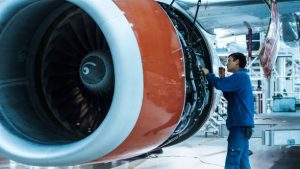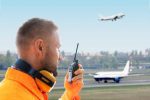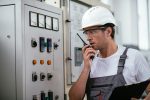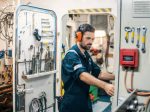| Aircraft Mechanic Key Stats | |
|---|---|
| Avg. Salary / year | $80,780 |
| Avg. Pay / hour | $38.84 |
| Education | 4+ Years |
| Job Outlook | 4.9% |
| Total Employed | 136,390 |
An aircraft mechanic is responsible for the routine maintenance, servicing, and emergency repairs of aircraft.
They have a good knowledge of the workings of different kinds of aircraft, and may be called to complete work on an engine, an airframe, electrical and hydraulic systems, avionics, instruments, landing gear, radar and radio equipment, and propellers.
To become an aircraft mechanic, you’ll have a knack with all things technical and related to engineering.
You’ll also need good vision and hearing.
You’ll be an excellent problem solver, and also be able to think on your feet.
Attention to detail is also important, as a small mistake can have grave consequences in this role.
Aircraft mechanics are sometimes referred to as power plant technicians, airframe technicians, or avionics technicians.
Go to Page Section:
Education Requirements for an Aircraft Mechanic
To become an aircraft mechanic, you must be 18 years of age and a US Citizen.
The FAA provides several pathways for people to become qualified aircraft mechanics.
You must also sit the FAA prescribed tests and examinations to achieve your aircraft mechanic’s certificate.
The first pathway is through work experience.
After an apprenticeship 18 months of experience working with either power plants or airframes, or 30 months of experience working on both at the same time, you will be qualified to take the FAA prescribed tests.
The second route is through education.
You can enroll in an FAA approved aviation maintenance technician school, then upon graduation, sit the test to be given your aircraft mechanic’s certificate.
The test itself is made up of three parts.
The first is a written examination on theory, the second an oral test, and the third a practical test.
Aircraft Mechanic Job Description
An aircraft mechanic will work roughly 40 hours per week.
As airports are open 24 hours a day, it’s likely that you will be employed on a rotating roster and have to work some night shifts.
Overtime may also be required.
Working on aircraft, a strict adherence to safety standards is required.
If a mechanic does not follow the strict rulings of the FAA, they face losing their certificate.
Some of the duties of an aircraft mechanic include:
- Regularly inspect aircraft
- Perform preventative maintenance
- Service aircraft regularly
- Keep a comprehensive record of all aircraft serviced
- Keep an inventory of tools and supplies
- Cleaning aircraft
- Cleaning hanger
- Staying alert for safety problems
- Participate in test flights
- Pick up and deliver parts
- Pick up and deliver aviation fuel
Line maintenance crews work at large airports.
They will inspect planes between flights, and also make minor repairs which may be required.
Routine services are held at an overhaul base; the mechanics that work here are often more experienced, or have knowledge within a specialized field.
In a smaller airport, all maintenance would be conducted on site.
There are several branches of specialization that an aircraft mechanic may fall into.
Some of these include.
- Airframe technician
- Power plant technician
- Avionics Technician
- Flight instrument repair personnel
Aircraft Mechanic Salary and Career Path
Computer technology has greatly transformed the role of an aircraft mechanic.
A part of this job is to keep up to date with new and upcoming technology.
Ongoing training and professional development is a large part of this role.
According to Salary.com, a recently qualified aircraft mechanic could expect a salary of around $57,000 a year.
Those with some experience behind them will earn the median wage of around $76,000.
Those at the top of their game could earn close to $100,000 a year.
As a rough rule, the larger the aircraft a mechanic is working on, the higher their salary will be.
Also, larger airlines will pay higher wages than smaller ones, or private owners of aircraft.
With experience, aircraft mechanics may specialize in a niche field, such as avionics, or airframes.
They may also advance to supervisory positions in some instances.
Those who gain a pilot’s license and flying experience may become flight engineers.
If you have a passion for aviation and enjoy mechanical work, then working as an aircraft mechanic may appeal to you.
Working conditions are good, and your employment is secure.
There is a good amount of growth forecast in the sector also.
Working as an aircraft mechanic also offers a stimulating and challenging workplace, as well as opportunities for further professional development and advancement.
![]() The below information is based on the 2024 BLS national averages.
The below information is based on the 2024 BLS national averages.
National Average Salary
$80,780Average Salary by State
| State | Avg. Annual Salary |
|---|---|
| Alabama | $77,020 |
| Alaska | $87,010 |
| Arizona | $79,040 |
| Arkansas | $55,550 |
| California | $85,750 |
| Connecticut | $82,950 |
| Delaware | $87,220 |
| Florida | $79,270 |
| Georgia | $84,060 |
| Hawaii | $87,450 |
| Idaho | $68,640 |
| Illinois | $85,860 |
| Indiana | $66,480 |
| Iowa | $71,280 |
| Kansas | $73,370 |
| Kentucky | $78,900 |
| Louisiana | $72,970 |
| Maine | $71,590 |
| Maryland | $90,600 |
| Massachusetts | $92,230 |
| Michigan | $73,750 |
| Minnesota | $90,950 |
| Mississippi | $71,180 |
| Missouri | $62,660 |
| Montana | $66,930 |
| Nebraska | $67,350 |
| Nevada | $91,290 |
| New Hampshire | $75,330 |
| New Jersey | $109,380 |
| New Mexico | $71,670 |
| New York | $99,290 |
| North Carolina | $75,440 |
| North Dakota | $75,940 |
| Ohio | $79,320 |
| Oklahoma | $79,010 |
| Oregon | $84,870 |
| Pennsylvania | $74,860 |
| Rhode Island | $61,800 |
| South Carolina | $67,020 |
| South Dakota | $74,760 |
| Tennessee | $77,210 |
| Texas | $80,430 |
| Utah | $71,660 |
| Vermont | $82,280 |
| Virginia | $84,640 |
| Washington | $83,700 |
| West Virginia | $55,900 |
| Wisconsin | $71,350 |
| Wyoming | $69,460 |
| Guam | - NA - |
| Puerto Rico | $40,620 |
The highest-paying state in this field is New Jersey, with an average salary of $109,380.
Here are the five states with the highest salaries in the field:
* Employment conditions in your area may vary.
Frequently Asked Questions
What does an aircraft mechanic do?
An aircraft mechanic is responsible for performing scheduled maintenance and repairing helicopters and airplanes.
To ensure that the aircraft is in optimal flying condition, mechanics also complete inspections as required by federal agencies.
Aircraft mechanic’s responsibilities would typically include: measuring parts for wear; examining aircraft frames and different parts for defects; reading maintenance manuals; diagnosing electrical or mechanical problems; repairing aircraft components and replacing defective parts; testing aircraft parts; keeping records of repair and maintenance work.
Aircraft mechanics can work with different types of aircraft (helicopters, jets, propeller-driven airplanes…), while others might specialize in a particular section of the aircraft (hydraulics, engine…).
Typically, aircraft mechanics do not work with electronic flight instruments as it is the job of an avionics technician.
How much do aircraft mechanics make?
On average, aircraft mechanics earn about $39.000 in the United States annually.
You can expect to make anywhere between $37.000 and $45.000, however, there are professionals that earn more.
A top-level aircraft mechanic with years of experience would typically earn around $21.5 per hour.
In case you are an entry-level mechanic, you can expect to make about $18 hourly.
You can earn a higher salary, if you work for a major airline, an express delivery service (like FedEx, for example), for a gas and oil extraction company, and some others.
How much does it cost to become an aircraft mechanic?
In most of the cases, you can become an aircraft mechanic only by completing one of the federally approved programs.
An associate’s degree will cost anywhere between $8.000 and $30.000.
In case you decide to acquire a bachelor’s degree in aircraft maintenance, you would have to pay $20.000-$80.000.
If you have a bachelor’s degree, your entry-level salary will typically be higher.
Test preparation courses for your certification exams will cost you between $150 and $2.500.
The actual FAA certification costs anywhere between $100 and $600 per exam.
What is the demand for aircraft mechanics?
Between 2016 and 2026, the job market for aircraft mechanics is expected to grow by 4.9%.
The profession provides weak employment opportunities.
Small commuter and regional airlines are the fastest-growing segments that would have a demand for new employees.
Air mechanics would typically go for a place within major airlines, but the competition is extremely high.
New and modern aircraft have reduced maintenance requirements.
Mechanics with a degree and those who hold various up-to-date certificates will find more working opportunities.
How long does it take to become an aircraft mechanic?
It will take you two years to acquire an associate’s degree or four years to obtain a bachelor’s degree.
In case you decide to go for a federally approved training program, it will take you between 18 and 24 months to complete one of those.
You would need some extra time to prepare for the certification exams.
Those who have a background in physics, mathematics, electronics, computer science or chemical engineering will surely have more working opportunities, so taking a course in any of the fields mentioned above will be helpful for your future career.














